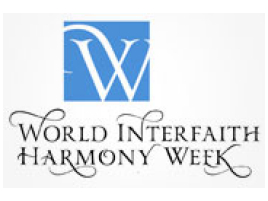UN launches first World Interfaith Harmony Week
By UN News Service | Feb 04, 2011

On February 1st, 2011, The United Nations launched the first World Interfaith Harmony Week with a broad range of activities around the world, including interfaith breakfasts, film screenings and talks featuring the active participation of civil society, UN entities and other intergovernmental organizations.
The UN General Assembly in November resolved that the first week of February be devoted to spreading “the message of interfaith harmony and goodwill in the world’s churches, mosques, synagogues, temples and other places of worship… based on love of God and love of one’s neighbour or on love of the good and love of one’s neighbour, each according to their own religious traditions or convictions.”
“The first World Interfaith Harmony Week is an opportunity to focus global attention on the efforts of religious leaders, interfaith movements and individuals around the world to promote mutual respect and understanding between followers of different faiths and beliefs,” Secretary-General Ban Ki-moon said in a message. “These partners play an indispensable role in supporting United Nations efforts for peace.
“Respect for diversity and peaceful dialogue are essential if the human family is to cooperate globally to face shared threats and seize common opportunities,” said Mr. Ban.
“That is why efforts by States, civil society and other actors to build trust among communities and individuals lie at the heart of so many United Nations initiatives, from the Alliance of Civilizations to our wide-ranging work to protect human rights, promote social cohesion and build a culture of peace.”
The Alliance of Civilizations is an initiative launched in 2005 by Spain and Turkey under UN auspices to promote better cross-cultural relations worldwide.
From Jerusalem to Malappuram in India, from Amman in Jordan to Pietermaritzburg in South Africa, from Sedona in the United States to Newcastle in Australia, and a myriad of other places special events are being held to shine the spotlight on the need for interfaith understanding.















